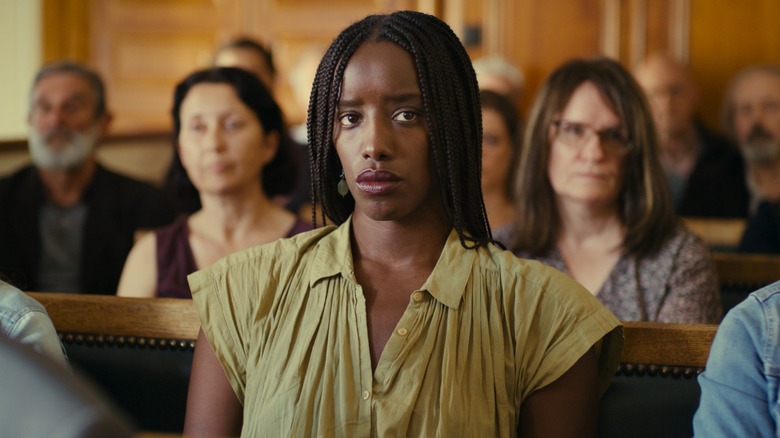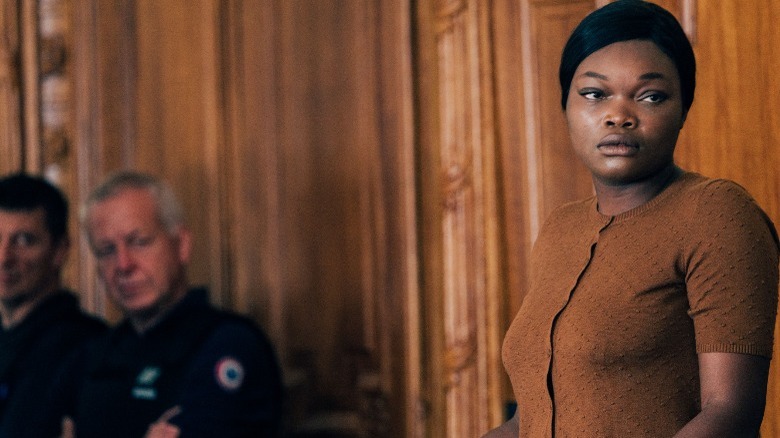Saint Omer Review: A Quiet, Simmering Courtroom Drama [London Film Festival]
In "Saint Omer," the fiction debut of French filmmaker Alice Diop, Rama (Kayije Kagame) is a literature professor at a prestigious French university. She seems disconnected from her family — when she's at dinner with them, she barely speaks, and when she does, her responses are short and deliberately non-descript. There's the sense that Rama would very much rather keep things to herself than share with her family. She's traveling to witness a high-profile court case, with the hopes of using the case to write a contemporary adaptation of the Medea myth.
The case in question involves Laurence Coly (Guslagie Malanga), a Ph.D. student studying philosophy and a Senegalese immigrant. She's accused of something unthinkable — when her child was just 15 months old, she abandoned her on the beach with the intention of leaving her to be swept away by the tide to die. To put it simply, and no less brutally, Laurence is accused of infanticide. Interestingly, this is not something that Laurence denies — the trial isn't so much about whether she did it, but why she did it, to see if she's truly guilty of the crime.
Rama finds herself drawn to Laurence not only as a subject she wishes to write about but on a much more personal level. Like Laurence, Rama is also in a mixed-race relationship, and the two share a challenging and complicated relationship with their mothers (and Rama's mother is also an immigrant). In slow, deliberate takes, Laurence speaks of her challenging upbringing and the painful isolation she's felt both from French society and her own family while in France. This leads Rama to struggle greatly with her own situation, possibly out of fear that her own life feels uncomfortably close to Laurence's. Rama is also pregnant, which stokes fear — could she possibly do the same thing to her unborn child?
Laurence is an incredibly complicated character. A feeling came over me while watching "Saint Omer," as I found myself desperate to understand precisely why Laurence would commit something as shocking as infanticide. Despite spending a tremendous amount of time looking straight at Laurence, and hearing her speak for what feels like the majority of the film, Laurence still feels almost inaccessible. This isn't a film interested in easy answers, but it is interested in the startling fact that some things, no matter how much we want, will never be fully comprehended. It's made all the more fascinating because a courtroom is, theoretically, the exact place where the truth is supposed to be made clear, but the resolutions remain murky in "Saint Omer."
A harrowing study of motherhood
As Laurence Coly, Malanga delivers a stunning performance. It's an extremely challenging role, as ostensibly Laurence is not someone you're supposed to identify with. But the court case slowly pulls back the layers of her character, she opens up with startling clarity that makes her easy to identify with. Malanga performs with honesty and poise as she is in countless long takes and forced to interrogate every possible part of her complicated character. There's a single moment — a smile — between two characters that says so much with so little. The adage "don't judge a book by its cover" may be overused, but it is a sentiment that "Saint Omer" understands well. The film reckons with racism in France, and how discrimination based on race manifests itself in subtle and more obvious ways. This is a film that often feels as radical as it is minimalistic.
"Saint Omer" is naturalistic, patient cinema. This is a courtroom procedural through and through, but it feels nothing like an American court drama. There are no surprise witnesses or last-second revelations that make you question everything you've seen up to that moment. There are certainly no sweeping music cues. There's no sensationalism of any kind to be found in Diop's film. Instead, "Saint Omer" is a film that wears its influences with pride, and it feels in many ways like a kindred spirit to the films of Robert Bresson, particularly "The Trial of Joan of Arc."
That film too was a chamber piece where every possibility is thoroughly investigated through the form of a trial but formally is very sparse. Bresson's style was very minimalistic, focusing far more on story than form. He was a filmmaker far more interested in reality and truth and attempting to capture that, and that certainly seems to have made an impression on Diop. This may be Diop's first narrative feature, but she has made a number of impressive documentaries and the influence of Bresson and her own documentary work has combined beautifully. Diop films in long, uncompromising takes, and her subjects are almost always in the center of the frame. That allows for some truly striking compositions that never seek to distract, and instead keep our focus right on the person speaking or reacting.
If you're a big fan of courtroom dramas, this film is probably a great deal more akin to a real courtroom than a fictionalized one. It's slow and methodical in nature and feels distinctly European. It eschews every imaginable cliche of the genre, instead telling a story about motherhood, intergenerational trauma, race, and what it's like to be an immigrant. The film has considerable pedigree, winning the Silver Lion Grand Jury prize at Venice. "Saint Omer" is an intelligent, absorbing drama that had me under its intoxicating spell.
/Film Rating: 8 out of 10
Saint Omer screened as part of the London Film Festival 2022.

